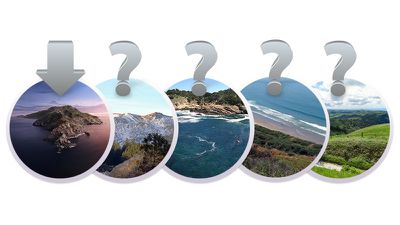Every year heading into WWDC, one question on many Mac fans' minds is what Apple will choose as the name for the next version of macOS. The tradition dates all the way back to the beginning of Mac OS X with its big cat names, and then in 2013 Apple shifted to Calfornia-themed names with the unveiling of OS X Mavericks.

Back in the early days after the debut of OS X Mavericks, we discovered a total of over 20 California-themed trademark applications filed by various limited liability companies that were all but certain to be shell companies created by Apple to hide its identity.
Over time, some of the trademarks like Yosemite, Sierra, and Mojave were indeed used by Apple for its major Mac operating system updates, while trademark applications for many of the other names have been abandoned.
In last year's lead-up to WWDC 2019, we noted that of that original set of trademark applications, only four unused ones remained active: Mammoth, Monterey, Rincon, and Skyline. All four of those trademarks had been granted by the U.S. Patent and Trademark Office, and Apple was keeping them alive for potential use by filing successive extension requests.
Trademark recipients have up to 36 months from the date of approval to file a Statement of Use proving they are using the trademark in commerce, although they are required to file for extensions every six months during that period to keep that full window open.
Apple of course opted to name its 2019 macOS release Catalina, which wasn't one of the previously trademarked names, but in case Apple has opted to go back to its original list, we decided to check back on last year's trademark list to see if any of them remain protected.
Of the four, Rincon is no longer active, having been abandoned in September 2019 after its 36-month window expired. The other three remain active for now, with Apple's presumed shell companies continuing to file extensions as needed.
- Mammoth, which is likely related to Mammoth Lakes and Mammoth Mountain, a popular area for skiing and hiking in the Sierra Nevada mountains, saw its trademark application approved in March 2019, and a second extension of the Statement of Use period was approved in March 2020. The full 36-month window won't expire until March 2022 as long as additional extensions continue to be filed.
- Monterey, a historic city and popular vacation spot on the Pacific coast, has long been one of the most popular macOS name options among our readers over the years. The trademark was applied for by Asilomar Enterprises LLC in December 2013, but wasn't allowed until June 12, 2018. A fourth extension to Statement of Use window was granted just last week, and Asilomar will have until June 2021 to prove commercial use of the name, provided a final extension is requested in December of this year.
- Skyline likely relates to the scenic Skyline Boulevard that largely follows the ridge of the Santa Cruz Mountains running south from San Francisco, and Antalos Apps LLC filed for a trademark on the name in December 2013. The trademark was allowed on March 20, 2018, and the fourth Statement of Use extension was granted in March of this year. The owner will have until March 2021 to prove use of Skyline in commerce, provided all necessary extensions are requested.
So what will macOS 10.16 be called? Mammoth, Monterey, and Skyline all seem like reasonable options, but we've also seen Apple turn to names that had not been previously rumored. In years when the new macOS version is viewed as more of a refinement of the previous version rather than a leap forward, Apple has used names that bear relationships to the previous ones, such as going from Yosemite to El Capitan and Sierra to High Sierra.
With macOS 10.16 again seeming to be more of a refinement release, could we see something like macOS Channel Islands (the island group that Catalina is a part of) or macOS Avalon (the only city on Catalina)? Or with Apple reportedly set to begin transitioning to its own Arm-based chips for its Mac lineup, could it shift gears to something completely different? Whatever it ends up being, we'll know one week from today.





















